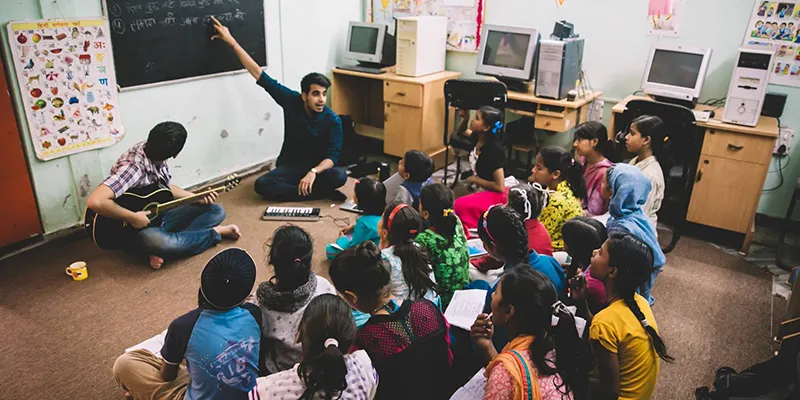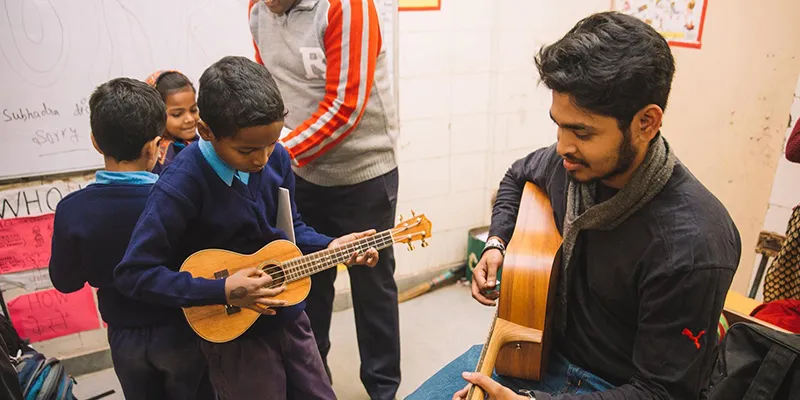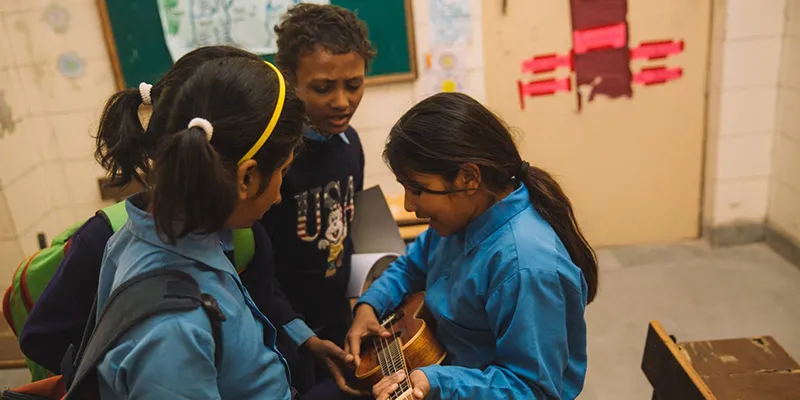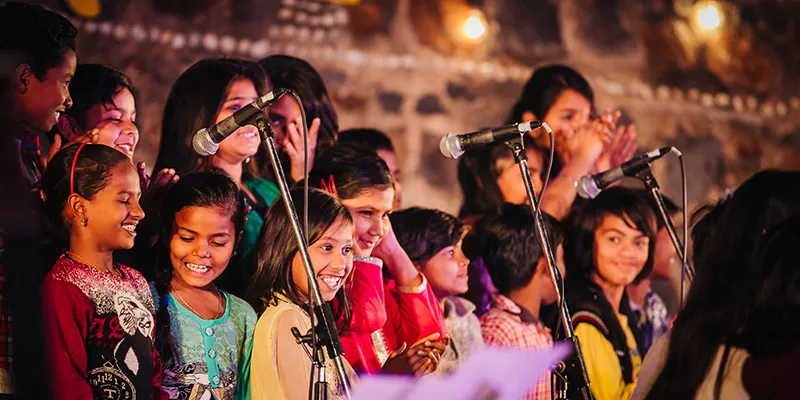How this NGO is tapping into music to enhance learning capabilities of underprivileged children
Music Basti has worked with hundreds of children through community music projects with an aim to create learning and exposure opportunities.

The relation between music and learning has long been established. The popular Mozart Effect, which indicates the improvement in learning abilities when exposed to a certain kind of music, has been proved by various scientific studies.
While there are numerous studies conducted over the decades on the effect of music on learning and the cognitive processes, most education systems around the world haven't taken extensive efforts to incorporate music into teaching and learning.
Faith Gonsalves, a 27-year-old from Delhi, who believes in the use of music and arts learning as subjects and as pedagogical tools, founded Music Basti, a music education programme for children from marginalised communities.
Music Basti
Music Basti was set up as a small artiste-led initiative in 2008, by Faith, a then student at Lady Sri Ram College, Delhi, along with a team of musician-volunteers. The project's team shared vision for every child to have inspiring learning opportunities.
In its initial years, Music Basti's programme was largely volunteer-driven through a series of short-term projects, with a focus on creating learning and exposure opportunities for hundreds of at-risk children in institutionalised child-care organisations.
Today's children need much more than to just be taught how to learn and remember facts. Students need content knowledge about language, math, science or civics, but equally, they need learning and innovation skills or 'life-skills', such as collaboration, communication, critical thinking and creativity for success in today's world.

"Music is more than just about performing or entertaining. It builds practical, transferable and applicable skills in areas of school, work, or social development. Every child has the ability and right to excel if given the opportunities and encouragement," says Faith.
Since 2008, Music Basti has been teaching a mixture of musical training, songwriting, and performing to the under-privileged and young kids. The team believes that children from lower socio-economic groups are extremely disadvantaged in their access to quality learning and opportunities in and out of school, to learn, be encouraged, and excel. The only thing separating them from their more affluent peers is opportunity.
Why music? That's a question that Faith and her team are often asked. She says, "Because responsible educators today cannot and should not be ignoring the evidence that music and arts programmes have shown across the world in supporting cognitive development, social and emotional skills learning and academic excellence for children. There are clear connections we can see between long-term music learning and group music learning programmes with developing motor skills, memory and recall, math and reading skills, as well as enhanced self-confidence and esteem, communication abilities, concentration and overall academic excellence."
ReSound
In 2013, Music Basti launched an annual music-learning programme called ReSound, which was designed to encourage children to develop the skills they need to achieve their best. Under the programme, the team has worked directly with over 850 students so far, in community-based NGOs and schools and trained over 100 musicians as teachers. The programme has three key components, namely, music in classrooms, teacher training and curriculum development.
In 2016, through partnerships the programme was launched in classrooms in government or low-income private schools, offering bi-weekly lessons. The content of the lessons includes a combination of musical training and songwriting, culminating in the annual ReSound concert, a public performance for all the programme's students.

"Through ReSound, more than 850 students have created and composed their own original songs about their aspirations, ideas and communities. Some of the most remarkable changes or achievements that have been observed in the programme are the students' confidence and teamwork. Our teachers have also observed positive growth among students in areas of leadership, discipline, responsibility and respect for others," says Faith.
The programme content focusses on introducing the fundamentals of music including rhythm, pitch and singing, music appreciation and listening, and song-writing and performance. Interwoven into the programme are opportunities for students to perform outside their schools at events, festivals or concerts, and also Music Basti's own public ReSound concert at the end of the year.
The team is developing teaching resources including curriculum frameworks, handbooks and instructional classroom videos to help teachers or musicians implement these practices into their own classrooms.
Future plans
Music Basti is currently in the process of placing their trained teachers in schools and community NGOs, where the teachers can lead the programmes on their own. The team aims to spread across eight-10 selected government schools in the NCR, work with about 200 students and recruit a team of about 25-30 teachers who could work in pairs across different classrooms.

The teachers for these programmes are selected through an annual call for applications, which is public and runs for four-six weeks in the summer. Music Basti is currently inviting applications from prospective teachers.
"Teachers are shortlisted, interviewed, auditioned and the selected team is awarded a scholarship to our teacher training programme. This training programme helps orient musicians to being effective teachers and managing a classroom and teaching pedagogies and best practices. They also receive mentorship and other capacity-building opportunities through the programme," says Faith.







